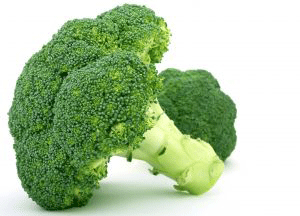A very interesting article was written on the Mayo Clinic website about broccoli’s ability to reverse diabetes damage. The Mayo Clinic is a very credible and highly renowned hospital that has a great reputation as a pioneer and innovator in medicine – patient care, medical research and academic education. The article discussed a research study in which scientists examined the phytochemical sulforaphane, found in broccoli.
Research has shown that sulforaphane seems to help:
- Produce enzymes in the body that protect blood vessels, which is achieved by reducing tissue damaging substances triggered by high blood sugar. Vascular disease is a major complication of diabetes. This type of disease can lead to heart disease, stroke, blindness, kidney failure, and circulation issues in extremities, which could lead to possible amputation.
- Activate genes that regulate protective antioxidant (scavenger harmful free radicals) and detoxifying enzymes.
- Eliminated defects in DNA (therefore, it’s not repeated/copied in gene formation meaning a reduction in cancer occurrence).
- Reduced prostate cancer in men
- And the one of the most significant findings was that broccoli may help with the reversal of high blood sugar damage.
To sum it up… broccoli is a super food!
If you find this information as interesting as I do and want to incorporate broccoli into your diet, but aren’t a huge fan of it, here are some alternatives. It’s good to know that broccoli is a member of the Brassica group of vegetables in the mustard family. Others in this family include:
- Root vegetables — rutabaga, turnips, kohlrabi
- Leafy vegetables — cabbage, Brussels sprouts, kale, rapini, collard greens, bok choy, napa (Chinese cabbage), mustard greens
- Flowers — cauliflower, broccoli, broccoflower
- Seeds — mustard seed and rapeseed (from which canola oil is derived)
Remember its recommended to eat 5-9 servings of fruits and veggies every day!

Thanks for providing such wonderful information. Broccoli is rich in Vitamin C that prevents cataract development.
Fascinating study indeed!
The reversal of diabetes complications would be stunning!
But then again, as you conclude in ‘To sum it up’, broccoli really IS a superfood!